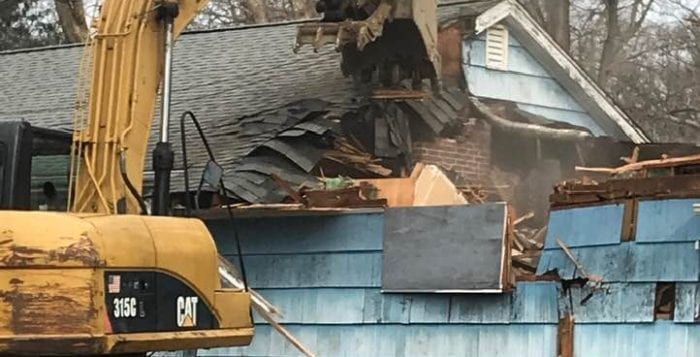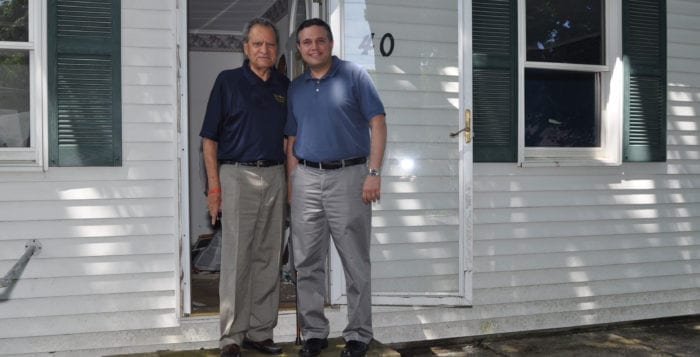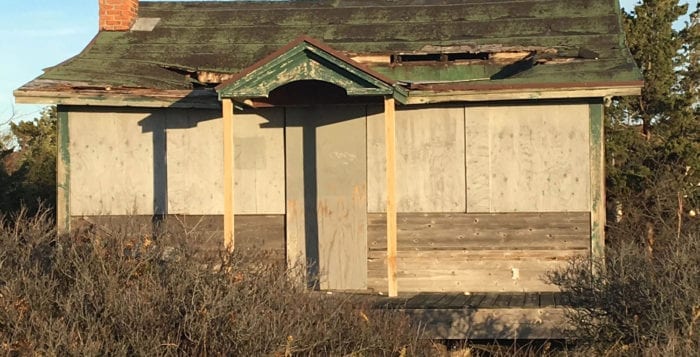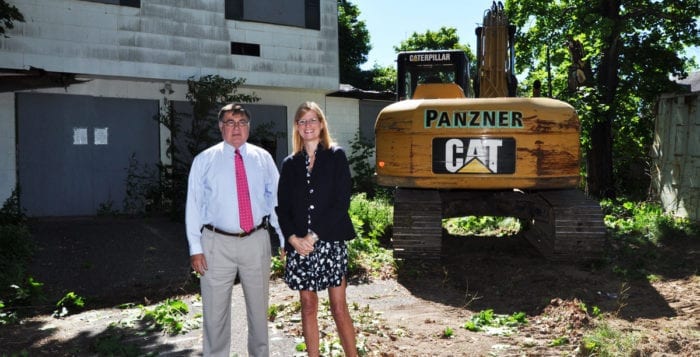There was once a house on Shinnecock Drive in Sound Beach. Now there is a vacant patch of land and rubble. From the front, it was close to idyllic, featuring a small single-floor cottage, a mason stone exterior, a picket fence and a worn birdbath sitting just behind a fence.
The house is gone, torn down by the Town of Brookhaven for being a derelict property. Brookhaven Councilwoman Jane Bonner (R-Rocky Point) said the frontage of the home was beautiful, but everything behind the front, what one couldn’t see from the street, was torn up and run down.
“It was like on a theater stage, the front looked good, but there was nothing behind it,” Bonner said.
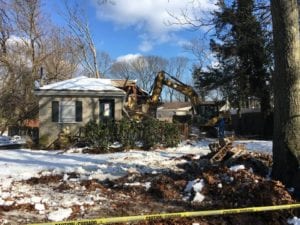
The work to take down derelict homes is constant. At the tail end of February, the town had demolished another home on Audrey Street in Miller Place. These vacant and derelict houses have had a menacing moniker affixed to them, zombie homes, and since the 2008 mortgage crisis and subsequent recession, they have become endemic on Long Island. At a Sound Beach Civic Association meeting March 11, Bonner explained the process the town takes to removing these blighted structures and explained the reasons why it’s difficult to repurpose the land after the home is torn down.
Town officials are informed about zombie homes in multiple ways. Residents can call up town hall or contact the council district office directly. Otherwise, Bonner said her office learns about these derelict buildings through interacting with the community at civic meetings or by just driving around the district.
The town sends out a third-party inspector, namely Hauppauge-based engineering firm Cashin, Spinelli & Ferretti LLC, to check on the home and make sure the property is vacant. If not, the house is then put on the vacant home registry, a long list of houses in the town that no longer have legal occupants.
At its annual March 11 state of the town address, Brookhaven town Supervisor Ed Romaine (R) said more than 250 zombie homes had been demolished since 2014. Bonner said the town currently has approximately 2,000 zombie homes in the process of being demolished by the town.
“When I started, I never thought the town would be in this kind of business,” Bonner said.
Bonner said her office often gathers information on a derelict property from the Suffolk County Clerk’s office, especially looking at whether the property’s taxes are current, whether there is a mortgage on the property, or whether the land is owned by an LLC. Town employees try to contact the homeowner, who is required to contact the town clerk, pay a fee of $250 and provide a point of contact for the maintenance company. However, this step is especially challenging, as often there are little means of contacting the homeowner, especially if they no longer live in the state and their contact information is not current. It could mean months of work talking to the banks or going through other channels to contact these people.
“When I started, I never thought the town would be in this kind of business.”
— Jane Bonner
If there is a significant number of problems with the property, and if there is no property management company the town can get a hold of, Brookhaven will go in and cut overgrown grass or board and secure the property, though they will only board and secure the first floor and the town does not repair roofs. After the inspection is done the inspector determines whether it meets the threshold for demolition. The inspection will also detail if there is asbestos on the property, which will mandate additional work to contain during demolition.
After the home is recommended for demolition, the town hosts a public hearing on the property. A typical town board meeting could have several of these public hearings for properties all across the town. Occasionally, the homeowner or bank that owns the property will come to the hearings and based on the arguments of the property owner, an extension could be made to allow the owner to fix up the property. Otherwise, the town allows 30 days after the public hearing before a final decision to raze a property is made.
“Occasionally, I think they don’t think we’re serious at the public hearing,” Bonner said. “Sometimes we give them time, other times we tell them they already had their 30 days.”
Brookhaven spokesperson Jack Krieger said the town expects to spend $1.8 million in 2019 on derelict properties, of which $1.2 million is directly related to demolition. The rest of that money is spent on support staff dealing with matters on contacting property owners or taking care of the property. The property owner is responsible for the demolition costs.
The town has two full-time employees who work directly on these derelict properties. Beyond that, each council member is supposed to be involved in the houses within their own district. Bonner said her office will spend a cumulative time of a full eight-hour day each week just dealing with these zombie homes.
Krieger said there have been 35 zombie homes demolished in district 2 since the zombie program began in 2013. That is peanuts compared to the likes of Mastic Beach, a village that had disincorporated in 2016. In that area, the town is dealing with more than 100 known derelict and run-down properties.
“Talk about impacting the quality of life,” Bonner said. “Talk about squatters, talk about drug dealing, talk about impacting your property values — there are a lot of components to it.”
These derelict properties often have issues with animal infestation, break-ins and squatters, which can intensify and lengthen the process of removing the run-down properties. But the biggest roadblock to bringing a house back up to standards might be the lien put on the property.
“Talk about squatters, talk about drug dealing, talk about impacting your property values — there are a lot of components to it.”
— Jane Bonner
After the town cleans up the property, Brookhaven will often put a lien on that property for the property taxes, either expecting the property owner or the county to pay back the town. In order to buy that property, a prospective buyer must satisfy that lien first, which on the steep end could be as high as $500,000, such as the case with the house on Audrey Street, according to Bonner.
These liens could make buying the now vacant property much harder, often leaving the property vacant for years with minimal means of getting a developer to build on the property with the extra fee coming from the lien.
“It’s kind of like a cog in the wheel, it gums up the work, it really does,” she said.
Mimi Hodges, a Sound Beach resident, asked why these houses couldn’t be rejuvenated using state loans to rehabilitate them. That, or start community projects in order to buy the property and turn it into housing for homeless veterans or other needy groups, an example of which was a land trust that was recently created in Uniondale by community members.
“To support the character of the community,” Hodges said. “Make it an affordable house.”

